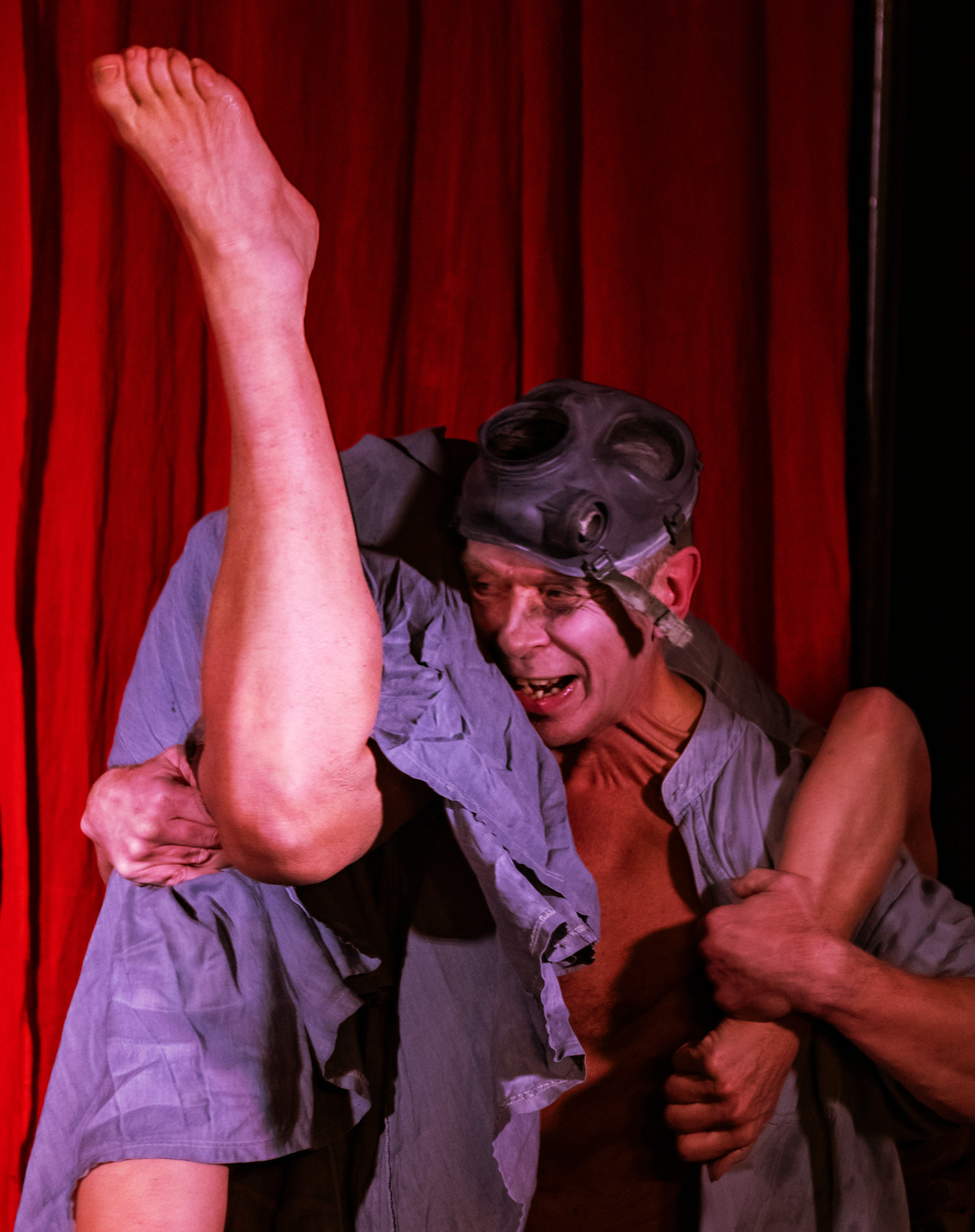Cassandra
'Game of Thrones meets Troy!'

Cassandra reworks the myth of the Trojan princess who was gifted to see the future and cursed to be disbelieved.
Cassandra is dangerous. Her compulsive need to speak the truth threatens the powers-that-be - especially at a time of national crisis. So they lock her away. Her life is dominated by four men: the father whose love she craves; the brother she hero-worships; the palace-servant obsessed with her; and the foreign soldier who haunts her dreams. Which will betray her?
"Multi Story have crafted an intense study of power, suspicion and the lingering fear of people whose beliefs are different to ours.
Written in the aftermath of 9/11, the play retains its potency in the current environment of political bravado and powerful stupidity. It’s a very-relatable story. A man’s daughter wishes to be helpful. She has fears. She has views. And she’s solidly ignored by almost everyone in her male-driven society.
Cassandra is a heated and challenging piece of theatre that demands your attention. This is one of those rare performances that still had me considering its implications the next morning."
Cassandra premiered at the Winnipeg Fringe in July 2002 and then moved on to Saskatoon and Edmonton. It garnered 5 star reviews and was Pick of the Fringe in all three cities. The production then played studio theatres, festivals and colleges in the UK and played Prague Fringe Festival in 2008. Conceived in the aftermath of 9/11, the questions it provokes are, regrettably, more pertinent than ever.
"A subtle, intriguing exploration of war and violence that neatly sidesteps preaching and sentimentality. The light and set design add to the intensity, creating eerie, surreal moments. This is beautiful theatre that gets under your skin."
age recommendation: 14+
promo video
technical details
- get-in two hours
- performance 60 minutes - no interval
- get-out 45 minutes
- performance area preferable minimum 4m x 4m x 3m height - the production is best presented end-on or arena
- lighting in theatres - cool and warm cover; three lamps in blue; three lamps in red; approx 12 states and 24 cues. In community venues we need access to a 13 amp socket for the small lighting rig and sound system that we carry
- sound in theatres: approx 24 cues. In community venues self-operated from on stage
- ancillary work we're more than happy to lead post-show discussions and we offer a menu of complementary workshops
- age advisory 14+
Filling in the holes
With Cassandra, Bill Buffery and Gill Nathanson continue to theatrically deconstruct Greek myth.
In such productions as last year's Earthly Delights and the memorable Medea, they have probed the ancient tales of Greece to find the age-old power of the stories and the aftershocks they set up in our own times.
The two, who write and direct their own material, illuminate their chronicles with intelligence and theatricality. The approach is spare - there are no wasted movements or empty ideas. And they are marvellous actors.
In Cassandra they use the myth of the daughter of the King of Troy whose blessing is the ability to see the future and whose curse is not to be believed.
This is probably the most contemporary of their plays. They use the myth as a commentary on society that has as much to do with 9/11 as with the machinations of ancient Greece. Here there are meditations on the nature of power, truth and trust, our suspicions and misunderstanding of people who don't share our beliefs, how war brutalizes all and, in a particularly telling observation, how we have sacrificed our own heroes and gods on the altar to economic benefit. The great war that brings down mighty Troy is fought over the imposition of a tax on wine.
Or perhaps it might engage you on the simpler plane of the old sci-fi conundrum - if you forecast an event, have you then set in motion forces that will cause it to happen?
It doesn't take much to hear the words of the war on terror (and the terrorists themselves) in speeches like "The barbarians scorn the freedoms we hold most dear" or "We wage war to save civilization itself." In fact, some of the dialogue is taken directly from the speeches of U.S. President George W. Bush. The play might as well end with Osama bin Laden and Bush screaming "barbarian" at each other across the gulf of misunderstanding.
This is not an easy work to understand and there are times when you are not sure what it's getting at. But that's part of the experience.
The two keep firing ideas and images at their audiences and letting us fill in the holes. We all come away from Cassandra with different, but probably valid, perspectives.
However, I don't want to give the impression that Cassandra is either impenetrable or a veiled lecture. It is intense, challenging and involving theatre presented by two performers who are in complete command of their medium.
Leave time when this one is over - you'll want to think about it. Or consider seeing it twice.
Colin Maclean, Edmonton Sun & CBC
The lighting here is remarkable. Manipulated by the actors it imparts a true sense of the spiritual
realm. Combined with the strong performances and story flow, it makes
Cassandra a must-see play.
Jon Waldman Winnipeg Sun
The dark, willowy Nathanson performs as though the
ill-fated priestess was conceived by the gods
with her in mind.
Morley Walker Winnipeg Free Press
Again, Nathanson and Buffery display their charged chemistry as
Buffery assumes the roles of all the men in the play. He
easily slips between characters, with each doing his best
to contain Cassandra's mind or her body.
CBC Manitoba
Gill Nathanson and Bill Buffery, from the multi story theatre company in Barnstaple, England, have consistently brought challenging plays - often modern restagings of classical stories - to the fringe circuit.
This year they are doing Cassandra, an elegantly brutal version of the life of the Trojan priestess whose fate was to foresee the future and have her prophecies ignored.
Nathanson's inhabitation of the title character is a wonder to watch, as is the quicksilver way that Buffery slips from the role of Cassandra's fated brother to her fateful lover and abductor. Their performances are so seductive they almost mask the dark message of Buffery's script: it is impossible to tell the civilized man from the barbarian.
The play was written in the aftermath of Sep 11, and its red and grey tones are a perfect palette for a world in which ash has covered over blood. In one section, Buffery pronounces a whirlwind speech incorporating phrases from an actual address given by George W. Bush. Initially they sound right, but ultimately ring hollow. Cassandra is the most nihilistic play this gifted pair of actors has yet performed at a Winnipeg Fringe Festival.
Robert Enright, Globe & Mail
Cassandra reworks the myth of the King of Troy's daughter whose gift was the ability to see the future and whose curse was to be disbelieved.
Cassandra is dangerous. Her compulsive need to seek out the truth threatens the powers-that-be - especially at a time of national crisis. So they lock her away. Her life is dominated by four men: the father whose love she craves; the brother she hero-worships; the palace-servant who is obsessed with her; and a foreign soldier who haunts her dreams. Which of them will betray her?
Gill Nathanson and Bill Buffery, who write and direct their own material, illuminate their chronicles with intelligence and theatricality. Nathanson performs as though the ill-fated priestess was conceived by the gods with her in mind. Buffery effortlessly assumes the roles of all the men in the play, each doing his best to contain Cassandra's mind or her body.
"A subtle, intriguing exploration of war and violence that neatly sidesteps preaching and sentimentality. The light and set design add to the intensity, creating eerie, surreal moments. This is beautiful theatre that gets under your skin."
See Magazine


